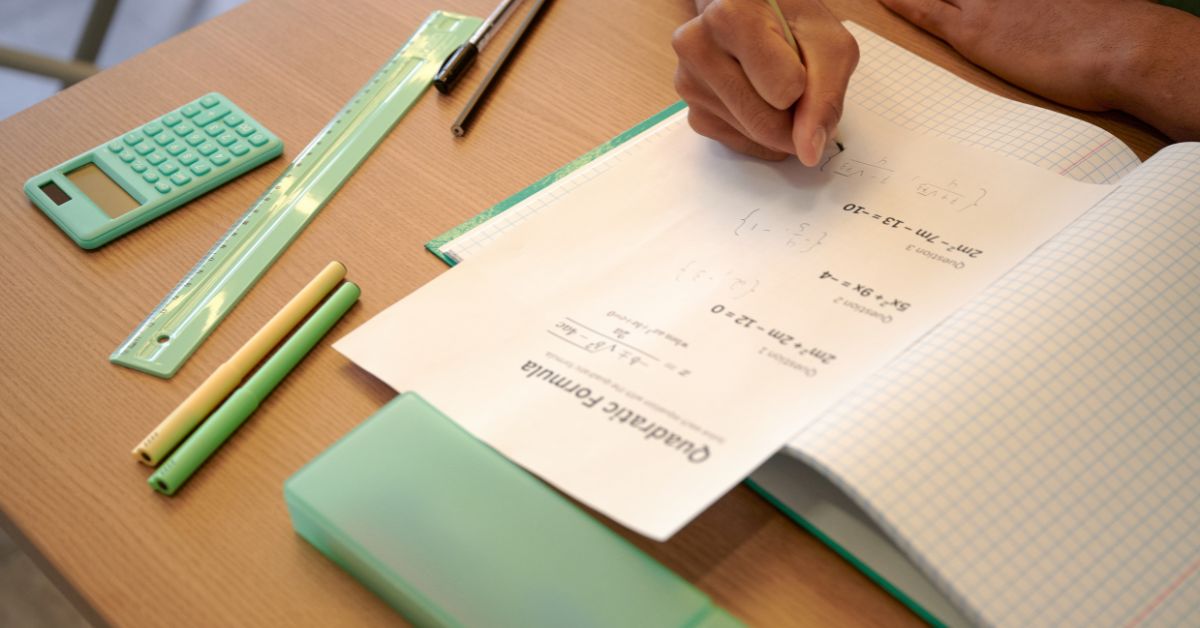Helping your middle schooler develop strong algebraic reasoning skills is an essential part of their math education. Algebra forms the foundation for higher-level math, problem-solving, and critical thinking, all of which are valuable in academic and real-world situations. If you’re homeschooling, teaching algebra might feel like a daunting task, but with the right strategies, resources, and mindset, you can make it a rewarding experience for both you and your child.
This post will walk you through practical ways to teach algebraic reasoning and provide actionable middle school math strategies to help your child succeed.
Why Algebra Skills Matter For Middle School Students
Middle school is when children move from arithmetic to abstract thinking in math. Developing algebra skills helps students learn how to think logically, identify patterns, and break down complex problems into manageable parts. These reasoning skills go beyond solving equations and are critical for success in subjects like geometry and calculus, as well as in everyday problem-solving.
For homeschool parents, teaching algebra provides the opportunity to build these skills in a one-on-one setting. Beyond just solving for x, algebraic reasoning involves understanding relationships between numbers, variables, and operations. This focus on reasoning, rather than rote memorization, equips students with the tools to tackle math challenges confidently.
Here’s how you can help your child excel in algebra and develop solid reasoning skills that will serve them for years to come.
Build Algebraic Thinking Little By Little
Algebra isn’t just about equations; it’s about learning to think in new ways. By introducing algebraic concepts early and incrementally, you can help your child build confidence and understanding before jumping into complex topics.
Here are some practical steps to get started:
- Introduce Variables Gradually
Start by using small puzzles or real-life examples where letters or symbols replace numbers. For instance, “If x + 3 = 7, what is x?” makes variables approachable without overwhelming your child. You can even tie it to everyday activities, like calculating how many apples you need if you’ve already bought three but want a total of seven. - Practice Pattern Recognition
Algebra relies heavily on recognizing patterns, so look for opportunities to practice this skill. Use sequences like 2, 4, 6, 8… and ask your child what comes next. Once they’re comfortable, you can challenge them to find the formula behind the sequence, such as “2n for even numbers.” - Use Visual Models
Visual aids, such as algebra tiles or number lines, help children understand abstract concepts more clearly. For example, use tiles to model equations like “2x + 3 = 7” by visually representing each component, then work toward solving it step by step. - Focus on Real-World Applications
Show your child how algebra is useful in everyday life. Work on projects like budgeting, calculating discounts, or crafting recipes. When students see the purpose behind what they’re learning, it feels more relevant and less intimidating.

Prioritize Problem-Solving Over Memorization
It’s easy to fall into the trap of teaching formulas and mechanical steps without context. However, focusing on problem-solving develops critical thinking, teaching your child how to approach a question rather than just giving them steps to follow.
Here’s how to implement this in your teaching approach:
- Encourage Logical Thinking
Ask your child open-ended questions to challenge their reasoning. Instead of just asking for the answer, try this approach: “Explain how you got that answer,” or “What if we changed this number? How would the solution change?” - Make Mistakes Part of Learning
Normalize making mistakes and use them as teaching moments. When you work through an error together, your child sees how to identify and correct mistakes, which is an essential part of algebraic reasoning. - Offer Multi-Step Challenges
Introduce multi-step problems that require combining different skills, such as solving equations, working with fractions, and interpreting graphs. These challenges encourage your child to think holistically and apply everything they’ve learned so far.
Teaching Algebraic Reasoning Through Word Problems
One of the best ways to help your child develop algebraic reasoning skills is by working through word problems. These problems show how algebra applies to real-world situations while encouraging critical thinking.
When tackling word problems, start by teaching these strategies:
- Break Down the Problem
Teach your child to identify what the question is asking, what information they’ve been given, and which operations they’ll need to use. For example, in the problem “Sarah has 20 apples and gives x apples away. If she has 12 left, how many did she give away?” the key is to translate the word problem into an equation like “20 – x = 12.” - Draw It Out
Visual representations like diagrams, drawings, or graphs can simplify complex word problems. If the problem involves distance, for instance, a simple visual can help your child understand relationships between speed, distance, and time. - Solve in Steps
Break the problem into smaller pieces, solving each step sequentially. For example, if a multi-step problem involves calculating a percentage and then subtracting it from a total, show them how to tackle one part at a time.
Regular practice with word problems strengthens algebraic reasoning and builds your child’s confidence in applying algebra to practical situations.
Incorporate Fun and Engaging Activities
Math doesn’t have to feel like a chore. Fun, hands-on activities can spark your child’s curiosity and help them develop algebra skills naturally. Gamifying lessons or using interactive resources makes abstract concepts like variables and equations come to life.
Here are some engaging activity ideas for practicing algebra:
- Math Games and Apps
Invest in math-based games or apps that focus on algebraic reasoning. Many educational platforms offer activities that blend play with learning, such as solving equations to unlock rewards or participating in time-bound challenges. - Card and Board Games
Games like Uno, Set, or even custom-designed algebra flashcards are great for practicing math thinking. Create a game where each card represents an equation, and solving it allows your child to advance a space or collect a prize. - DIY Algebra Projects
Encourage your child to explore algebra through projects like measuring and cutting materials for DIY crafts, building logic puzzles, or even designing a simple budget for a pretend trip. These activities apply algebra concepts in unique and creative ways. - Interactive Online Resources
Platforms such as Khan Academy, IXL, or Purplemath offer video lessons, exercises, and quizzes tailored to middle school math. These can supplement your efforts and provide additional practice for tricky topics like inequalities or graphing.
Fitting Algebra Practice Into A Homeschool Routine
For busy homeschooling parents, fitting regular algebra practice into your already-packed schedule doesn’t have to be overwhelming. Developing strong algebraic reasoning skills doesn’t require hours of daily practice; consistency is what matters most.
- Set Aside Short, Focused Sessions
Rather than long, drawn-out lessons, aim for 20-30 minute algebra sessions a few times a week. Breaking concepts into digestible chunks helps your child absorb information without becoming frustrated. - Use Spiral Review
Revisit previous topics regularly to reinforce learning and make connections between old and new material. For example, if you’re introducing quadratic equations, review basic arithmetic or linear equations to show the progression. - Adapt to Your Child’s Learning Style
Every child learns differently, so tailor lessons to their needs. If they learn through movement, try a hands-on approach with physical objects. If they prefer visual learning, rely on graphs, illustrations, and diagrams. Stay flexible and adjust your teaching strategies as needed. - Mix Independent and Guided Practice
Alternate between working through problems with your child and allowing them to solve on their own. Guided practice helps them learn in the moment, while independent work builds confidence.
Teaching algebra skills for middle school at home gives you the unique chance to foster a deeper understanding of math in your child’s learning environment. By focusing on problem-solving, incorporating engaging activities, and practicing consistently, you’ll help your child develop the reasoning skills they need not only for algebra but for the challenges that lie ahead. With time, patience, and the right strategies, you’ll empower them to approach algebra with confidence.


